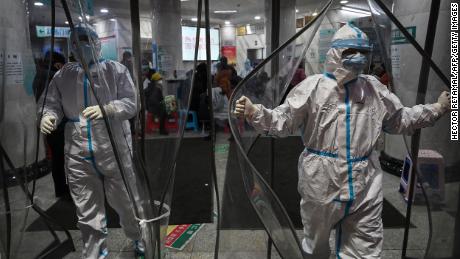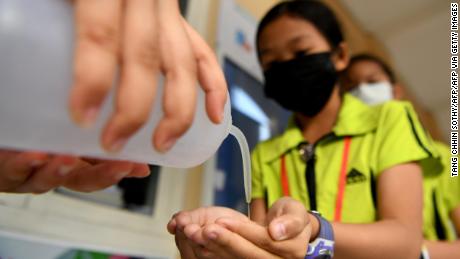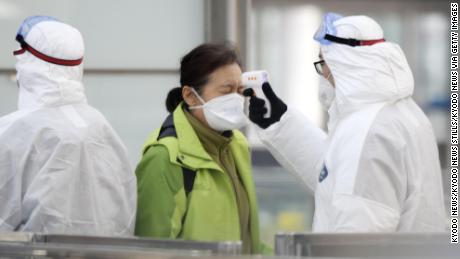The number of total cases worldwide now exceeds 6,000.
The world has never had more advanced medical science, but it’s also never been so interconnected. So what can be done to stop it from becoming a global epidemic?
The World Health Organization (WHO) has stopped short of calling it a
global health emergency, but there’s no disputing that it is spreading. Over the weekend, Chinese President
Xi Jinping warned the outbreak is accelerating.
“Life is of paramount importance. When an epidemic breaks out, a command is issued. It is our responsibility to prevent and control it,” he said, according to Chinese state media.
First thing’s first. How bad is it?
Although it’s scary to think of a deadly virus spreading, it’s important to remember that the vast majority of cases so far have not been fatal.
The mortality rate is changing as the numbers of people affected change. As of Tuesday, Wuhan coronavirus’ mortality rate was about 2.3%. By comparison, the WHO estimated that the severe acute respiratory syndrome (
SARS) outbreak of 2003 had an
overall fatality ratio of 9.6%. Middle East respiratory syndrome (
MERS) — another type of coronavirus — has a mortality rate of
35%.
However a large proportion of the coronavirus cases are considered “
severe” and very few people have so far been released from hospital after recovering, according to official numbers.
So how are doctors treating it?
There are no specific treatments for coronaviruses, which range from the common cold to SARS. But just like the common cold, doctors can treat the symptoms, said Dr. Maria Van Kerkhove, head of the WHO’s emerging diseases and zoonoses unit.
David Heymann, the WHO’s Assistant Director-General for Health Security and Environment, said doctors would be making sure patients can breathe properly and give them life support if required. Aside from that, the benefit of keeping people in hospital would be isolating them from the general population, so they can’t infect others.
What else can doctors do?
The way to stop an outbreak is to work out who a patient has had contact with, and try to stop them from spreading the virus, Heymann said.
Doctors put all the contacts the patient has had recently under “fever
surveillance,” he said. If those contacts develop a fever, then they are immediately tested for the virus — and then their contacts need to be traced. Hospitals must follow good practice, so that doctors themselves are not helping the disease.
“By tracing contacts, identifying new cases, isolating new cases, you can interrupt transmission eventually,” he said, adding that was how the 2003 SARS outbreak was brought under control. “Those are the things you can do — clean up hospital practices, make sure that they’re done well so that you don’t transmit in hospitals, and at the same time, make sure that you’re tracing contacts and identifying all cases.”
What about travel bans?
Authorities in Hong Kong, which borders mainland China, have established travel bans, telling residents of Hubei and those who have visited the province in the past 14 days that they can’t enter the city. They’ve also said that all public, cultural and leisure facilities will be closed “until further notice” in a move to control the spread of Wuhan coronavirus. On Tuesday, Hong Kong announced it was
closing many of its borders with mainland China.
In mainland China, isolation has been taken to another level.
Chinese authorities have
shut down transport in and out of Wuhan and at least 10 other cities, effectively quarantining millions of people. Wuhan’s mayor, Zhou Xianwang, told state broadcaster CCTV on Monday that even though history may not remember the move kindly, “we think as long as it’s good for the control of the epidemic and people’s safety, we are willing to take any responsibilities for locking down the city.”
Peter Daszak, president of non-profit EcoHealth Alliance, which researches emerging infectious diseases, hailed the move as “bold,” saying it was not without political risks but might be enough to help stop coronavirus spreading.
It’s a move that’s never been done before at such magnitude — and it has prompted
criticism from some experts.
There were smaller quarantines during the 2014
Ebola outbreak in West Africa, but those led to violent protests and a distrust of public health authorities, said Lawrence Gostin, a professor of global health law at Georgetown University and director of the WHO’s Center on Global Health Law, adding that the move could even hamper the outbreak response.
Others have cautioned that it may be unwise for logistical issues. Wuhan health authorities earlier said local hospitals are overwhelmed, and the city plans to build two more hospitals within days.
“The health risks for people in the city depends on how they’re closing it down,” said Heymann, referring to food and medical supplies. Even so, the move would hopefully decrease the number of cases that made it to other countries, he added.
What about vaccines?
Last century, smallpox killed about
300 million people, according to the World Economic Forum. Thanks to vaccines, it became the first deadly disease to be completely wiped out.
So it’s no surprise that scientists would want to develop a vaccine for the Wuhan coronavirus. According to Daszak, there are already vaccine candidates — and scientists around the world are working towards developing
one.
But even if scientists do successfully develop a vaccine, it might not be ready in time to treat this outbreak.
According to Dr. Anthony Fauci, director of the US National Institutes of Allergy and Infectious Diseases, it will take a few months until the first phase of clinical trials begin — and then more than a year until a vaccine might be available.
Heymann, from the WHO, said it’s highly unlikely that any vaccines that come up for study during this outbreak would be available anytime soon.
“They’ll be available if this outbreak continues for any long period of time, but nobody knows what will happen to this outbreak,” Heymann said.
Even then, a vaccine can’t be used to treat people with the virus — it can only be given to people who haven’t already been exposed to it.
Should the WHO declare a global health emergency?
So far, the WHO has decided not to declare a public health emergency of international concern (PHEIC) — although Dr. Takeshi Kasai, the WHO’s regional director for the Western Pacific, warned “it may yet become one.”
A PHEIC is
defined as something that constitutes a public health risk to other states due to the speed of it spreading overseas, which requires a coordinated international response. If a PHEIC is declared, all WHO member states must abide by the WHO Emergency Committee’s
recommendations.
Last week, the WHO said that while the outbreak was serious in China, it had not yet hit a global level. But the WHO may also be concerned about creating unnecessary panic.
During the SARS outbreak that infected more than 8,000 people and killed 774 around the world between November 2002 and July 2003, the WHO warned visitors not to travel to Hong Kong. In May 2003, the WHO withdrew that advisory, but Hong Kong remained on a list of affected areas
until June 23, 2003.Some considered that move to be an overreaction,
according to a paper published in the Journal of the Royal Society of Medicine in August 2003.
“In some circles, the WHO is perceived to have overreacted to the epidemic, causing unnecessary panic on the international scene and putting unjustified barriers in the way of persons from ‘infected’ areas wishing to attend such events as business exhibitions or international sports activities,” the paper said.
So what can the public do? Are masks useful?
Masks are being used so widely in Hong Kong and mainland China that stocks are running low.
Wearing masks is now mandatory for those going out in public in Wuhan. The Chinese central government has asked manufacturers of medical face masks to resume production over the
Lunar New Year period. According to the Ministry of Industry and Information Technology, 30 factories have resumed production and are making 8 million masks each day.
But it’s still unclear how the virus is spread, or whether masks would stop it, Heymann said.
“There’s no evidence that it’s circulating in a way that could prevent it,” he said. And even if the disease can spread through the air, masks might not be entirely effective. “Masks are very tricky to wear,” he added, explaining that if there is an air gap in the mask, it won’t work.
What else can be done?
Experts say there is one simple thing you can do: wash your hands.
The WHO’s Van Kerkhove
said she recommends washing hands with soap and water and sneezing into your elbow, if you have to sneeze.
Informing people about what to look out for is also vital, according to Heymann. If a person who is asymptomatic shows up in an airport, they may not be picked up by authorities who are only screening for fever.
“A border doesn’t stop infections, people can cross borders while they’re in the incubation period. So screening will pick out some, but it certainly won’t get others,” Heymann said.
“So what’s important at screening is to tell people, not only ‘we’re taking your temperature’. But giving them some kind of notification about where they go should they get a fever.”
CNN’s Elizabeth Cohen and Dakin Andone contributed to this report.






























